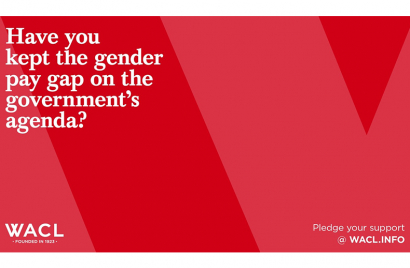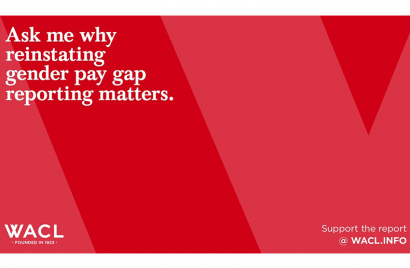
No AI without DEI
Hattie Matthews, Co-Founder and CEO of Uncharted on why diversity is the cornerstone of responsible AI

A hard-hitting campaign, in partnership with the Fawcett Society and the Chartered Management Institute, lays out the urgent need to reinstate mandatory Gender Pay Gap reporting.

WACL (Women in Advertising and Communications) has launched a new campaign calling for the reinstatement of mandatory Gender Pay Gap reporting.
The campaign follows the suspension of GPG reporting last year and comes amidst a growing number of data points pointing to the disproportionate impact of the coronavirus crisis on women. Earlier this month the Women and Equalities select committee warned that the government risked “turning the clock back” on gender equality by overlooking the labour market and caring inequalities faced by women during the pandemic.
As the WACL campaign warns: “The UK government is wavering over Gender Pay Gap reporting. No measurement means no management if not reinstated. This is a crisis for gender equality and the progress for all women that so many have fought for.”
The message will run across outdoor advertising sites and on social media with the message also being shared on Zoom backdrops and T-Shirts, all calling on individuals to sign the petition to MPs to avoid rolling back on women’s hard-won economic progress.
It's crucial for organisations to better support, retain and promote women. This begins with analysing their pay data and developing quality action plans with employees.
Jackie Stevenson
Laying out the need for the petition, Jackie Stevenson, President of WACL, explains: "The COVID pandemic has disproportionately affected women in the workplace with research showing that women are more likely to work in shut-down sectors, are at greater risk of job losses and are taking on the majority of housework and childcare. GPG data has repeatedly shown that there are still far too few women progressing into senior management and leadership positions and worryingly, McKinsey research has identified that the pressures of the pandemic are driving some women to consider scaling back or leaving their careers. It's crucial for organisations to better support, retain and promote women. This begins with analysing their pay data and developing quality action plans with employees."
Stevenson continues: "We acknowledge the current pressure on many businesses brought about by COVID-19 but shelving mandatory GPG reporting will not alleviate that pressure. By contrast, in countries where it remains mandatory, there is strong evidence to prove mandatory GPG reporting works. A study in Denmark not only found a statistically significant increase in the total number of companies reporting and a narrowing of the Gender Pay Gap, it also showed that profitability in those firms remained unaffected by the legislation, likely because it led to increased productivity."
The WACL team believes that decades of work to close the Gender Pay Gap is at stake if this flagship report is shelved. Gender Pay Gap reporting actively contributes to a more equal society and in a post-COVID-19 world, a commitment to reinstating this flagship annual report has become more critical than ever.
WACL joins a coalition of equalities groups, business leaders and campaigners, who have released a joint statement with the Fawcett Society asking for the urgent reinstatement of mandatory pay gap reporting.
Felicia Willow, Chief Executive of the Fawcett Society, explained: “In 2020, the enforcement of gender pay gap reporting for large employers was suspended due to a concern of the impact of reporting on employers. What we've seen since then is the pandemic policy response disproportionately impacting women, particularly at work. We know more women have been furloughed, have lost their jobs, have had their hours cut, and have had greater disruption due to home-schooling than men. And we know that the impact on disabled women, Black women, and other minority groups has been even worse.”
She continued: “Gender pay gap reporting is one way that employers can identify issues that need action. A year ago, we didn't know what we faced. Now, we know that we face significantly worsening inequality that may take decades to redress. There is no reasonable argument supporting the claim that gender pay gap reporting should remain unenforced in 2021.”


The campaign comes ahead of International Women’s Day on 8th March 2021, when WACL and CMI will host a joint workshop and panel for business leaders, moderated by Ann Francke, CEO of the CMI, with the goal of helping businesses understand the positive impact of reporting their Gender Pay Gap. The event will provide practical advice on Gender Pay Gap Reporting and walk through the steps they need to take to do so, and then write a strategy to address it.
Because of its belief that equality is good for business and society, WACL is also campaigning for mandatory Ethnicity and Disability Pay Gap reporting. WACL shares the Equality & Human Rights Commission’s view that “Pay Gaps reflect broader inequalities in society and tackling them is an important way to achieve a fairer society.”
The campaign is the latest iteration of WACL’s ‘deeds not words’ approach to practical and action-orientated campaigning and the organisation has been on the front foot when it comes to campaigning for flexible working. WACL’s #FlexibleFirst campaign is supporting the Women & Equalities Select Committee recommendation that the UK government amends the Flexible Working Regulations 2014, to remove the 26-weeks’ service threshold for employees to request flexible working arrangements.
Visit WACL’s Change.org page to sign the petition.
Gender Pay Gap reporting is more crucial than ever if the inequalities intensified by COVID-19 are to be addressed.
Jackie Stevenson, the President of WACL, has issued a joint statement with the Fawcett Society and the Chartered Management Institute to lay out the benefits of equality to both business and society. Its arguments for the reinstatement of Gender Pay Gap reporting include:
Looks like you need to create a Creativebrief account to perform this action.
Create account Sign inLooks like you need to create a Creativebrief account to perform this action.
Create account Sign in